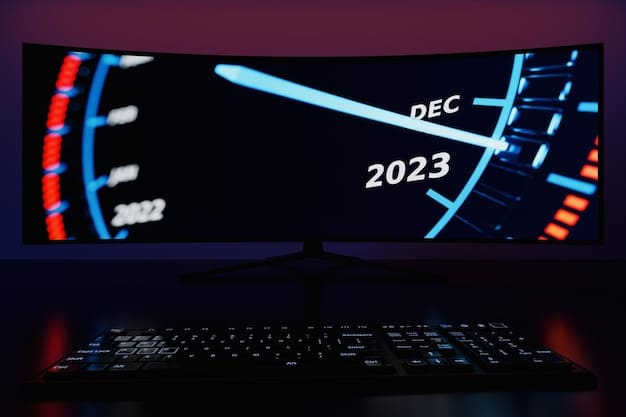4K Streaming in Brazil: Is Your Internet Fast Enough? A Practical Guide

4K streaming in Brazil requires a robust internet connection to avoid buffering; this guide provides practical tips on assessing your internet speed and optimizing your setup for a seamless viewing experience.
Is your internet up to the challenge of 4K streaming in Brazil? Discover practical tips to ensure a buffer-free viewing experience and enjoy your favorite content in ultra-high definition.
Understanding 4K Streaming Requirements in Brazil
4K streaming has revolutionized how Brazilians enjoy movies, series, and documentaries. However, the jump from HD to 4K is significant, placing much greater demands on your internet connection. Understanding these requirements is essential for avoiding frustrating buffering issues and ensuring a smooth viewing experience.
In this section, we’ll delve into the technical aspects of 4K streaming, explore the specific internet speed recommendations, and discuss factors that can impact your streaming quality in Brazil. Whether you’re a seasoned streamer or new to the world of 4K, this information will help you optimize your setup and make the most of your viewing experience.
Minimum Internet Speed for 4K Streaming
The minimum internet speed recommended for 4K streaming is generally around 25 Mbps. However, this is just a baseline. For a consistent and reliable experience, it’s often better to have a connection that exceeds this minimum.
Several factors can influence the ideal speed, including the streaming service you’re using and the number of devices connected to your network. If multiple devices are using the internet simultaneously, you’ll need even more bandwidth to prevent buffering.
Factors Affecting Streaming Quality
Even if you meet the minimum internet speed requirements, other factors can still impact your 4K streaming quality. These include:
- Network Congestion: During peak hours, internet service providers may experience congestion, leading to slower speeds and buffering.
- Router Quality: An outdated or low-quality router can limit your internet speed and signal strength.
- Device Capabilities: Your TV, streaming device, or computer must support 4K resolution and have the necessary processing power.
- Distance from Router: The further your device is from the router, the weaker the Wi-Fi signal becomes.
In conclusion, understanding the technical requirements for 4K streaming is the first step to ensuring a smooth and enjoyable viewing experience. By knowing the recommended internet speeds and being mindful of the factors that can affect streaming quality, you can optimize your setup and minimize buffering issues.
Assessing Your Current Internet Speed
Before diving into 4K streaming, it’s crucial to assess your current internet speed to ensure it meets the necessary requirements. This involves running speed tests and understanding the results to determine if your connection is capable of handling 4K content without constant interruptions. Reliable speed tests are essential to get an accurate assessment.
This section will guide you through the process of accurately measuring your internet speed and interpreting the results in the context of 4K streaming in Brazil. By the end of this section, you’ll have a clear understanding of your internet’s capabilities and any potential limitations.
How to Run an Accurate Speed Test
To get an accurate assessment of your internet speed, follow these steps:
- Use a Reputable Speed Test: Popular options include Speedtest by Ookla, Fast.com (Netflix’s speed test), and Google’s speed test.
- Close Unnecessary Applications: Ensure no other devices are streaming, downloading, or using significant bandwidth during the test.
- Connect Directly to Your Router: For the most accurate results, connect your computer directly to your router using an Ethernet cable.
- Run Multiple Tests: Run the speed test several times at different times of the day to get an average speed.
Understanding the Results: Download, Upload, and Ping
When you run a speed test, you’ll typically see three key metrics:
- Download Speed: This is the speed at which data is transferred from the internet to your device. It’s the most important metric for streaming.
- Upload Speed: This is the speed at which data is transferred from your device to the internet. It’s less critical for streaming but important for video calls and uploading content.
- Ping (Latency): This measures the time it takes for data to travel from your device to a server and back. Lower ping is better, as it indicates a more responsive connection.
Interpreting Speed Test Results for 4K Streaming in Brazil
To determine if your internet speed is sufficient for 4K streaming, focus on the download speed. As mentioned earlier, a minimum of 25 Mbps is generally recommended. However, consider the following:
- Multiple Devices: If multiple devices are using the internet simultaneously, you’ll need a higher download speed.
- Peak Hours: Internet speeds can fluctuate during peak hours, so test your speed at different times of the day.
- Service Recommendations: Check the specific recommendations of the streaming services you use. Some may require higher speeds for optimal 4K quality.
In summary, assessing your current internet speed is a vital step in preparing for 4K streaming in Brazil. By running accurate speed tests and understanding the results, you can determine if your connection is up to the task and identify any potential bottlenecks that need to be addressed.

Optimizing Your Network for 4K Streaming
Even with an internet plan that meets the minimum speed requirements, your network configuration can significantly impact your 4K streaming experience. Optimizing your network involves tweaking various settings and components to ensure a stable and efficient connection. This section covers essential strategies to optimize your home network for 4K streaming.
This section will guide you through improving your Wi-Fi signal, upgrading your router, and minimizing interference. By optimizing your network, you can reduce buffering and enjoy smoother, more reliable 4K streaming in Brazil.
Improving Your Wi-Fi Signal
A strong and stable Wi-Fi signal is crucial for seamless streaming. Here are some tips to improve your Wi-Fi signal:
- Position Your Router Strategically: Place your router in a central location, away from walls and obstructions.
- Use a Wi-Fi Extender: If your home is large or has thick walls, a Wi-Fi extender can help boost the signal in weak areas.
- Avoid Interference: Keep your router away from electronic devices like microwaves and cordless phones that can cause interference.
- Update Your Router’s Firmware: Manufacturers often release firmware updates that improve performance and stability.
Upgrading Your Router
An outdated or low-quality router can be a major bottleneck for 4K streaming. Consider upgrading to a newer model with the following features:
- Dual-Band or Tri-Band: These routers broadcast on multiple frequencies, reducing congestion and improving speeds.
- MU-MIMO Technology: This allows the router to communicate with multiple devices simultaneously, improving overall network performance.
- Gigabit Ethernet Ports: If possible, connect your streaming device directly to the router using an Ethernet cable for a more stable connection.
Minimizing Interference
Interference from other devices and networks can degrade your Wi-Fi signal and cause buffering. Take the following steps to minimize interference:
- Change Your Wi-Fi Channel: Use a Wi-Fi analyzer app to identify the least congested channel and switch your router to that channel.
- Limit the Number of Connected Devices: Disconnect devices that are not in use to free up bandwidth.
- Use a Wired Connection: Whenever possible, use an Ethernet cable to connect your streaming device directly to your router.
In conclusion, optimizing your network is essential for ensuring a smooth and reliable 4K streaming experience. By improving your Wi-Fi signal, upgrading your router, and minimizing interference, you can significantly reduce buffering and enjoy your favorite content in stunning ultra-high definition.
Choosing the Right Streaming Service
Selecting the right streaming service is crucial for enjoying 4K content in Brazil. Different services offer varying levels of 4K support, content quality, and features. Understanding these differences can help you choose a service that aligns with your viewing preferences and technical capabilities.
This section will provide a comprehensive comparison of popular streaming services in Brazil, focusing on their 4K offerings, content libraries, and pricing. By the end of this section, you’ll have the information you need to choose the right streaming service for your 4K needs.
Comparing Popular Streaming Services in Brazil
Here’s a comparison of some of the most popular streaming services available in Brazil, with a focus on their 4K offerings:
- Netflix: Offers a wide range of 4K content, including original series, movies, and documentaries. Requires a premium subscription for 4K streaming.
- Amazon Prime Video: Features a growing library of 4K content, including original shows and movies. 4K streaming is included with a Prime membership.
- Disney+: Offers a selection of 4K content, including Marvel, Star Wars, and Pixar movies. 4K streaming is included with a standard subscription.
- Globoplay: Features Brazilian content in 4K. Check the specific subscription requirements for 4K streaming.
Content Libraries and 4K Availability
When choosing a streaming service, consider the content library and the availability of 4K content. Some services may have a larger selection of 4K titles than others.
Always check the service’s website or app to verify which titles are available in 4K and if your device is compatible with 4K streaming.
Pricing and Subscription Options
Streaming services offer various pricing and subscription options. Some may offer free trials, while others may require a long-term commitment. Compare the pricing plans and features to find the best option for your budget and viewing habits.
Often, the plan with the most features is required to access 4K content, so read the fine print before committing.
In summary, choosing the right streaming service is essential for maximizing your 4K viewing experience. By comparing the content libraries, 4K availability, and pricing options of different services, you can find the one that best suits your needs and preferences. Brazil offers several streaming services from which to choose, so there’s likely one that fits your taste.
Understanding Data Caps and Usage in Brazil
Data caps are a critical consideration for 4K streaming in Brazil, where many internet plans come with monthly data limits. Streaming 4K content consumes a significant amount of data, and exceeding your data cap can result in additional charges or throttled speeds. Therefore, it’s essential to understand your data cap and how to manage your data usage effectively.
This section will provide an overview of data caps in Brazil, explain how much data 4K streaming consumes, and offer practical tips on managing your data usage to avoid exceeding your limits. By the end of this section, you’ll be well-equipped to monitor and control your data consumption while enjoying 4K streaming.
Overview of Data Caps in Brazil
Many internet service providers in Brazil impose data caps on their plans, limiting the amount of data you can use each month. These caps can range from a few gigabytes to several hundred gigabytes. Exceeding your data cap usually results in additional charges or a reduction in your internet speed.
Data caps are more common on mobile internet and older broadband plans, but they can also be present on newer fiber optic plans. Always check the terms of your internet plan to understand your data cap and any associated fees for exceeding it.
How Much Data Does 4K Streaming Consume?
4K streaming consumes a considerable amount of data compared to standard definition (SD) or high definition (HD) streaming. On average, 4K streaming can consume around 7 GB to 10 GB of data per hour. This means that watching a two-hour 4K movie can use up to 20 GB of data.
The exact amount of data consumed can vary depending on the streaming service and the quality settings. Some services allow you to adjust the streaming quality, which can help reduce data usage.
Tips for Managing Data Usage
To avoid exceeding your data cap while enjoying 4K streaming, consider the following tips:
- Monitor Your Data Usage: Use your internet service provider’s app or website to track your data usage throughout the month.
- Adjust Streaming Quality: Lower the streaming quality to HD or SD when 4K is not necessary.
- Download Content: Download movies and TV shows to watch offline, especially when using Wi-Fi.
- Use Data Compression Tools: Some apps and browsers offer data compression features that can reduce data usage.
- Avoid Streaming During Peak Hours: Streaming during off-peak hours can help reduce network congestion and data usage.
In conclusion, understanding and managing your data usage is crucial for enjoying 4K streaming without incurring additional charges or experiencing throttled speeds. By monitoring your data consumption, adjusting streaming quality, and following the tips outlined in this section, you can make the most of your internet plan and enjoy your favorite content in stunning 4K resolution.

Troubleshooting Common 4K Streaming Issues
Even with the best internet connection and optimized network, you may still encounter occasional issues with 4K streaming. Troubleshooting these issues can help you quickly identify the root cause and resolve the problem, ensuring a seamless viewing experience. This section covers common 4K streaming issues and provides practical troubleshooting steps.
This section will guide you through resolving buffering problems, addressing audio and video synchronization issues, and fixing resolution problems. By the end of this section, you’ll have the knowledge and tools to tackle common 4K streaming issues and keep your viewing experience smooth and enjoyable.
Resolving Buffering Problems
Buffering is one of the most common issues encountered while streaming 4K content. It occurs when your device doesn’t receive data fast enough to play the video smoothly.
- Check Your Internet Speed: Ensure your internet speed meets the minimum requirements for 4K streaming.
- Restart Your Router: Power cycle your router and modem to refresh your network connection.
- Clear Your Cache: Clear the cache and cookies in your browser or streaming app.
- Close Unnecessary Applications: Close any applications that are using bandwidth in the background.
Addressing Audio and Video Synchronization Issues
Sometimes, the audio and video may not be synchronized, resulting in a distracting viewing experience.
- Restart Your Device: Restart your streaming device or TV to resolve temporary synchronization issues.
- Check Your Cables: Ensure your HDMI cables are securely connected and in good condition.
- Update Your Device’s Firmware: Manufacturers often release firmware updates that improve audio and video performance.
Fixing Resolution Problems
If you’re not getting the expected 4K resolution, try the following:
- Check Your Device’s Settings: Ensure your streaming device and TV are set to output 4K resolution.
- Verify Content Availability: Confirm that the content you’re trying to stream is available in 4K.
- Use a 4K-Compatible HDMI Cable: Ensure you’re using an HDMI cable that supports 4K resolution and HDR.
In conclusion, troubleshooting common 4K streaming issues is essential for maintaining a high-quality viewing experience. By following the steps outlined in this section, you can quickly resolve buffering problems, address audio and video synchronization issues, and fix resolution problems, ensuring that you always enjoy your favorite content in stunning 4K resolution. 4K streaming in Brazil can be enjoyable with a stable connection.
| Key Point | Brief Description |
|---|---|
| 🚀 Minimum Speed | 25 Mbps is generally recommended for smooth 4K streaming. |
| 📶 Wi-Fi Optimization | Improve signal by positioning router and using Wi-Fi extenders. |
| 📊 Data Caps | Monitor usage; 4K consumes 7-10 GB per hour, adjust quality if needed. |
| 📺 Service Choice | Netflix, Amazon Prime, and Disney+ offer 4K content; check availability. |
Frequently Asked Questions
▼
The recommended minimum internet speed is 25 Mbps. However, for a more stable experience, a speed higher than this is preferable, especially with multiple devices using the same network.
▼
Position your router in a central, unobstructed location. Consider using a Wi-Fi extender to boost the signal in weak areas. Update your router’s firmware and avoid interference from other electronic devices.
▼
4K streaming typically consumes between 7 GB and 10 GB of data per hour. This consumption can vary based on the streaming service and the specific quality settings enabled.
▼
Netflix, Amazon Prime Video, Disney+, and Globoplay are some streaming services in Brazil that offer 4K content. Availability will vary. Check the service to determine if the content is available in 4K.
▼
Check your internet speed, restart your router and modem, and clear the cache in your streaming app or browser. Close any unnecessary applications that may be consuming bandwidth in the background.
Conclusion
Ensuring a smooth 4K streaming in Brazil involves several factors, from having adequate internet speed and optimizing your network to choosing the right streaming service and managing your data usage. By following the practical guide, you can troubleshoot common streaming issues and enjoy your favorite content in stunning ultra-high definition. With these steps, Brazilian users can improve their streaming experience.





